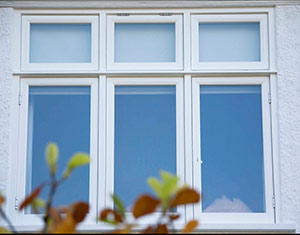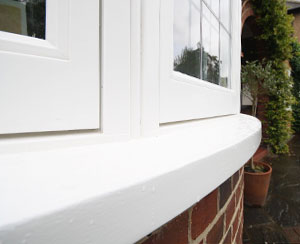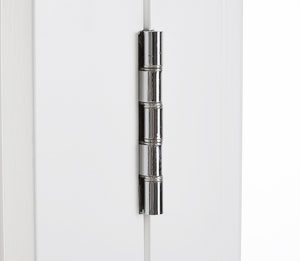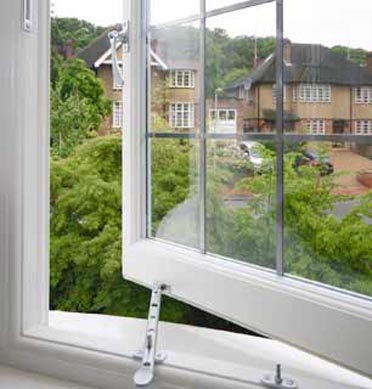Timber Casement Windows in London and Surrey
Restore Your Timber Casement Windows To Their Former Glory
Some styles had horizontal drip bars attached to the transoms, and others had vertical frame stiffeners that ran vertically down the mullions — giving the sashes a ‘recessed’ appearance.
LIPPED CASEMENT WINDOWS
Since the 1950’s, however, sashes have been designed with a lip running around the edge of the openers. This causes the sash to stick forward, or ‘proud’, from the fixed window frames. This modern style is known as a lipped casement or storm casement due to the overt weather-resistant double-rebate seal design.
FLUSH CASEMENT WINDOWS
The most popular option in London today is the period pre-1950’s flush casement style. This is the case for replacement windows, new build properties and the latest generation of uPVC timber lookalike windows. No matter your preferred style of casement window, all can be found and installed by our panel of approved period manufacturers who offer a high performance specification as standard. We work predominantly in Surrey and London.
Below, we’ve outlined the high specification that we insist upon from our approved manufacturers. You can also read about the upgrade options, should you wish to further extend the performance of your new
casement windows.


ANTI-WARP FRAME ENGINEERING
The most popular and cost-effective timber is cross grain laminated redwood frames on hardwood sills. Hardwood sills prevent that part of the window from rotting, due to the sill sitting on the damp exposed stone or brickwork. Cross grain laminated redwood is created by sawing the redwood into strips, and then bonding it back together with the grains facing opposite directions.
When the strips try to twist in opposite directions, they simply counter each other and the frame distortion is minimal. The service life of premium laminated redwood casement windows – assuming they are maintained – is around 50 years, which can be extended with refurbishment.
South-facing windows generally need to be painted more regularly than north-facing windows. If you’d prefer a longer service life than 50 years, see the upgrade options below.

FACTORY-GLAZED & FINISHED
Teknos, a world-leading timber paint manufacturer (and one of our preferred microporous paints), has conducted extensive research on the life span of
timber windows.
This research has proven that where timber windows are sealed, painted and glazed in a factory rather than on site (known as factory-finished), they will last up to a third longer and will require significantly less maintenance than windows that are glazed and painted on site.

LONG (8-12 YEARS) PAINTING CYCLES
Extend your painting cycles by applying 3-6 coats (or three thicker coats) of Teknos timber microporous paint at the start. We’ve found that, compared to standard painting cycles of 2-4 years, this additional step can extend your painting cycles to 8–12 years.
This technologically-advanced microporous paint allows the timber to breathe and prevents any flaking that you might see with oil-based paints. It essentially acts as a sun screen, preventing the sun’s harmful UV rays from damaging the timber underneath the paintwork. It’s worth noting that south-facing paintwork will require more frequent repainting those that are facing north.
There are a few ways that you can protect the paintwork at home as well. Washing the polluted dust from the external faces with a sponge and water twice a year can have a big impact. And when it comes to repainting, ensure you use the same water-based microporous paint as a base coat, which can be applied without sanding or removing the sashes, as you’d ordinarily do with oil-based paints.
Once repainted, your windows will look brand new again.

FIRST FIX OR FULLY-FINISHED INSTALLATION
Choose from either a first fix or fully-finished installation. First fix gives you the flexibility of having your windows installed into the opening, ready for your own builder to complete the finishing touches to the interior.
Opt for the fully-finished installation, however, and our approved installers will do it all for you, including making good the internal plasterwork, installing and painting the internal window boards and period architraves to perfectly match your new frames.

HINGE DEFENDERS
For extra security on the hinge side of opening sashes, a discreet ‘dog bolt’ can be fitted to the inside of the frame and sash.
It is out of sight and, when the sashes are closed, steel clasps lock it securely in place and prevent the hinges from been forced open from the outside.

PERFORMANCE GLAZING OPTIONS
Using the latest super soft coat low-e double glazing will ensure that your windows prevent more heat escaping than ever before. Furthermore, you can specify additional coatings and glass types for specific rooms to further enhance security, sound proofing and prevent harmful UV light from fading carpets and furniture.
Performance glazing can also prevent any overheating in south-facing rooms, conservatories and orangeries. Ask for details on performance glazing.

DESIGN OPTIONS
DECORATIVE GLAZING OPTIONS
As an alternative to clear glass, you can opt for lead strips on the glass in square, diamond or designer patterns. The glass in between these lead patterns can also be bevelled, sandblasted or coloured. If you have existing period stained glass windows, these may be refurbished or replicated.

ASTRAGAL BARS
Astragal bars were historically used as an alternative to lead, where the bars held smaller pieces of glass together to make larger panes. Astragal bars can be made up of single bars running horizontally or vertically across the glass, or they may be made up of squares or patterns. These pattern designs have, of course, evolved over time.

CHOICE OF PERIOD HANDLES
When buying period flush casement windows, you’ll either opt for a modern handle or choose from a range of period handles such as pear drop, teardrop, spoon and monkey tail designs. These options are all available, regardless of whether you choose a single point period espagnolette or a modern concealed multipoint locking operation. The latter offers better security and pulls the sashes tight to the frame for enhanced sound and Draught-proofing.

DUMMY OR WORKING BUTT HINGES
Period timber flush casement windows would typically have slim functional butt hinges that were visible on the outside of the windows. These could be silver, brass, black or white. Modern flush casement timber windows mostly have hidden friction hinges, offering good security and compression on the sash hinge side. If you’d like to retain an authentic period style, period dummy butt hinges may also be fitted once modern friction hinges are installed.

DUMMY OR WORKING PEG STAYS
If you opt for working period butt hinges on your windows, rather than modern friction hinges, you’ll need peg stays to hold your sashes in position when open. If, however, you choose friction hinges which automatically stay in position when the window is open, peg stays are an option rather than a necessity. In such cases, the peg stay is decorative. The peg stay can also be shaped to match your preferred handle type, i.e. a monkey tail handle would be matched with a monkey tail peg stay.

DUMMY SASHES
Unlike storm casement windows, it is standard practice with flush casement windows to insert dummy sashes (dummy openers) into the non-opening sashes. This period feature creates ‘equal sightlines’ to all parts of the window which is considered an attractive design feature.

YOUR FREE QUOTATION INCLUDES
A ‘no-salesperson’, no-obligation emailed quote
A free home visit, if required (for those in London and Surrey)
CAD drawings with detailed specifications for each quoted product
Realistic before & after photo simulations, if required




FOR LONDON AND SURREY
TIMBER WINDOW PRODUCTS
- SLIDING SASH WINDOWS
- CASEMENT WINDOWS
- BAY WINDOWS
- SPECIFICATIONS
TIMBER DOOR PRODUCTS
LOOKALIKES & ALTERNATIVES
- SITEMAPS:
- SITEMAP HTML
- SITEMAP XML
- URL LIST
- ROR
- Privacy Policy
© Copyright 2022 London Timber Windows and Doors Ltd All Rights Reserved. Company number 10273992

